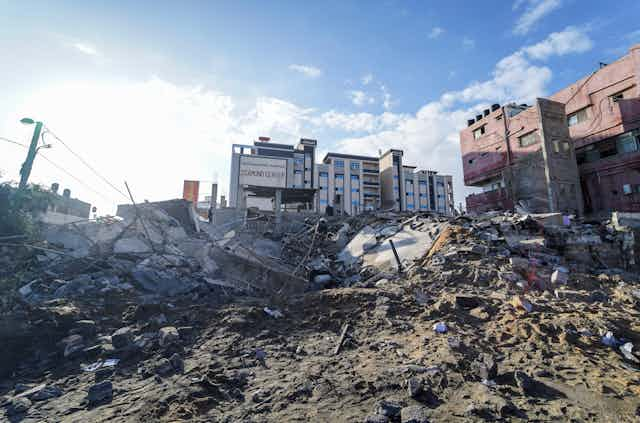Day by day, as Israel continues its assault on Gaza, the death toll mounts. According to the Gaza health ministry more than 18,500 people have now been killed in the Israeli army’s air and ground assault – and the Israel Defence Forces have lost 115 personnel, including ten killed on December 12.
Meanwhile, the UN seems incapable of any effective response. The UN secretary general, António Guterres, invoked Article 99 of the UN charter last week for only the sixth time in the body’s history, to force the security council to discuss the conflict as a matter that “may aggravate existing threats to the maintenance of international peace and security”. But still, despite overwhelming support for a ceasefire in resolutions voted on by the general assembly, the US has once again wielded its veto in the security council.
Emma McClean, an expert in international law at the University of Westminster, believes that the geopolitical considerations driving the US, UK and France on the one hand and Russia and China on the other means that the security council is now at deadlock and the UN has exhausted all its options for meaningful action. In the face of Israeli intransigence over a ceasefire, the UN is now powerless to act, she says.
Read more: Gaza war: deadlock in the security council shows that the UN is no longer fit for purpose
But, to a large extent, Israel’s intransigence is dependent on the support of Washington. And Joe Biden has now made it fairly clear that, while he backs Israel in its fight to eradicate Hamas as a military and political force, it’s not a blank cheque. Biden has his own political interests to consider with an election race looming next year. He is currently trailing the presumptive Republican nominee, Donald Trump, and so must take his own voting base into account.
Dafydd Townley, a US politics expert at the University of Portsmouth, says that thus far the issue is not featuring as a major election issue just yet. But as costs mount and US television audiences see day by day reports focusing on the humanitarian disaster unfolding in Gaza, Biden is likely to want to put a degree of distance between himself and Benjamin Netanyahu.
Read more: Gaza war: US-Israel relationship is in period of transition as Biden says Israel is losing support
It doesn’t help that Netanyahu and some of his political allies are indulging in rhetoric that – while appealing to Israeli hawks – could be seen as tantamount to threatening ethnic cleansing in Gaza. When he announced the beginning of the land assault on the Strip on October 27, the Israeli prime minister made a sinister allusion to a Bible story: “‘You must remember what Amalek has done to you,’ says our Holy Bible.” Amalek crops up several times in the Bible – usually in an apocalyptic frame of reference: “Now go and smite Amalek, and utterly destroy all that they have, and spare them not; but slay both man and woman, infant and suckling, ox and sheep, camel and ass.”

Gaza Update is available as a fortnightly email newsletter. Click here to get our updates directly in your inbox.
The agriculture minister, Avi Dichter, referred to the assault on the Gaza Strip as “Gaza Nakba 2023”. This is a direct reference to what Palestinians call “the Nakba”, or “the catastrophe” in 1948, when armed Zionist militias systematically destroyed Palestinian cities and towns and forced 750,000 people to flee their land. Afaf Jabiri, an expert in Middle East politics at the University of East London, writes that – in effect – the vast majority of displaced people in Gaza have already been forced from their homes once and were living in refugee camps. Now there are few safe places for them to flee to.
The Israeli perspective
While the IDF’s assault on Gaza has the support of the majority of the people in Israel, its architect – the prime minister – does not. John Strawson, an expert in Israeli politics from the University of East London, has recently returned from a trip to Israel and writes that he found people angry at their government and a widespread feeling that the international community has abandoned Israel since October 7 and is focusing on the humanitarian catastrophe in Gaza rather than the 135 hostages still believed to be held in Gaza.
Read more: Gaza war: Israelis feel angry at their government and abandoned by the international community
Many women in particular were angry at the international feminist movement for what they perceive as a lack of solidarity over the rapes and other sexual crimes committed against women during the Hamas assault. Dyan Mazurana and Anastasia Marshak of Tufts University in the US are scholars who work directly with victims of war-related sexual violence and other serious crimes.
They believe that some experts may have hesitated because Hamas hasn’t been known in the past to use sexual violence in its attacks against Israeli civilians. “These violent acts suggest an intent to utterly destroy their victims, while also terrorizing the Israeli public and humiliating Israeli men, Israel’s military and the state of Israel,” they write, adding that given the level of planning involved in the October 7 attacks, it’s highly unlikely that the use of sexual violence was not part of Hamas’s strategy.
Read more: Hamas' use of sexual violence is an all-too-common part of modern war − but not in all conflicts
As Israel continues its push south the death toll will almost certainly include hostages. And, as Leonie Fleischmann of City University of London notes, its almost certain that Hamas will drive a harder bargain for their release than they exacted during the humanitarian pause in Gaza. In 2011, Israel released 1,027 Palestinian prisoners, including 300 who had killed Israelis, in exchange for just one Israeli soldier, Gilad Shalit, who had been held captive for five years.

But as she notes here, the ferocity of Israel’s ground offensive will make it very difficult for any further prisoner-hostage swaps unless there is a further pause or even a ceasefire – which remains unlikely as things stand.
Read more: Gaza war: what do we know about the hostage-prisoner exchanges and are they likely to resume?
Peace in prospect?
Despite US pressure as noted above, Israel is said to want a further two months to complete its military operation on the Gaza Strip. And the question of what happens afterwards remains opaque. Julien Tourreille and Charles-Philippe David of the University of Quebec in Montreal believe that the least worst option might be to set up some kind of transitional authority there – similar to arrangements that brought an end to fighting in East Timor and Kosovo in the 1990s.
But this would, of course, involve an agreement in the UN security council. You can make your own judgement about how likely is to happen.
Read more: Why we should consider a transitional administration for Gaza
The big fear throughout this crisis has been that it might escalate into a regional war, bringing in Lebanon and Iran. And there are daily reports of attacks by Hezbollah fighters on Israeli positions, while in Iraq and Syria, US military bases have been targeted by Iran-backed militias.
Bashir Saade, an expert in Middle East politics and religion at the University of Stirling, evaluates Hezbollah’s strategy as spelled out recently in speeches by its leader, Hassan Nasrallah. Hezbollah’s aim, he writes, is to force Israel to fight on two fronts and inside its own borders. Meanwhile, regular attacks on US bases in the region by Hezbollah and other armed Islamist groups will encourage the US to put pressure on Israel to agree to a ceasefire. Again, how this plays out remains to be seen.
Read more: Gaza war: how Hezbollah has opened a second front inside Israel
Gaza Update is available as a fortnightly email newsletter. Click here to get our updates directly in your inbox.

